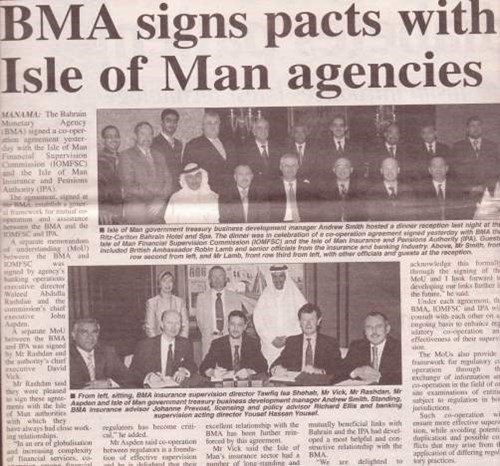 MANAMA: The Bahrain Monetary Agency (BMA) signed a co-operation agreement yesterday (23-2) with the Isle of Man Financial Supervision Commission (IOMFSC) and the Isle of Man Insurance and Pensions Authority (IPA).
MANAMA: The Bahrain Monetary Agency (BMA) signed a co-operation agreement yesterday (23-2) with the Isle of Man Financial Supervision Commission (IOMFSC) and the Isle of Man Insurance and Pensions Authority (IPA).
The agreement, signed at the BMA, establish a general framework for mutual co-operation and assistance between the BMA and the IOMFSC and IPA.
A separate memorandum of understanding (MoU) between the BMA and IOMFSC was signed by agency's banking operations executive director Waleed Abdulla Rashdan and the commission's chief executive John Aspden.
A separate MoU between the BMA and IPA was signed by Mr Rashdan and the authority's chief executive David Vick.
Mr Rashdan said they were pleased to sign these agreements with the Isle of Man authorities. with which they have always had close working relationships.
"In an era of globalisation and increasing complexity of financial services, cooperation among financial regulators has become critical," he added.
Mr Aspden said co-operation between regulators is a foundation of effective supervision and he is delighted that their excellent relationship with the BMA has been further reinforced by this agreement.
Mr Vick said the Isle of Man's insurance sector had a number of long-standing and mutually beneficial links with Bahrain and the IPA had developed a most helpful and constructive relationship with the BMA.
"We are delighted to acknowledge this formally through the singing of the MoU and I look forward to developing our links further in the future," he said.
Under each agreement, the BMA, IOMFSC and IPA will consult with each other on an ongoing basis to enhance regulatory co-operation and effectiveness of their supervision.
The MoUs also provide a framework for regulatory cooperation through the exchange of information and cooperation in the field of on-site examinations of entities subject to regulation in both jurisdictions.
Such cooperation will ensure more effective supervision, while avoiding potential duplication and possible conflicts that may arise from the application of differing regulatory practices.